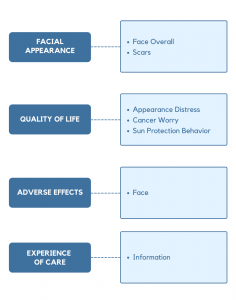RESEARCH
Can be used in research studies and clinical trials to study different approaches to treatments.
FACE-Q Skin Cancer is a rigorously developed patient-reported outcome measure that can be used to measure outcomes for any type of facial skin cancer surgery. This FACE-Q module was developed from concept elicitation interviews with 15 patients with a range of different types of skin cancer. FACE-Q Skin Cancer was then field-tested in a USA study involving 209 patients.

The conceptual framework for FACE-Q Skin Cancer covers 3 domains: appearance, health-related quality of life, and experience of care. Each domain is composed of 1 or 2 independently functioning scales. This FACE-Q module also includes 2 checklists that measure Sun Protective Behavior and Adverse Effects. The variety of scales/checklists provides flexibility to choose the subset best suited to measure the outcomes of interest in any given study or clinical situation.
Can be used in research studies and clinical trials to study different approaches to treatments.
Carefully designed to meet the requirements of regulatory bodies.
Used to benchmark outcomes in quality improvement initiatives.
Used in clinical practice at a growing number of hospitals to measure outcomes from patients’ perspective.
The FACE-Q Skin Cancer includes 5 independently functioning scales and 2 checklists that measure outcomes important to patients from their perspective. Clinicians and researchers are able to administer the subset of scales relevant to their situation.
Two scales measure appearance. One measures satisfaction with how the face looks (e.g., shape, contour, symmetry, looks up close). The second scale measures how bothered someone is by facial scars (e.g., color, width, length, location how noticeable).
Two scales measure quality of life. The first measures appearance-related distress (e.g., feeling self-conscious, unhappy and embarrassed about appearance). The second measures cancer worry (e.g., skin cancer might spread, become more serious, result in death).
The FACE-Q Skin Cancer module has a scale that measures satisfaction with information provided about appearance and skin cancer scars and how these would change and heal over time.
This module includes 2 checklists that measure sun behavior (e.g., wore sunscreen, stayed in shady areas) and adverse effects following skin cancer treatment (e.g., pain, numbness, tingling, swelling).



